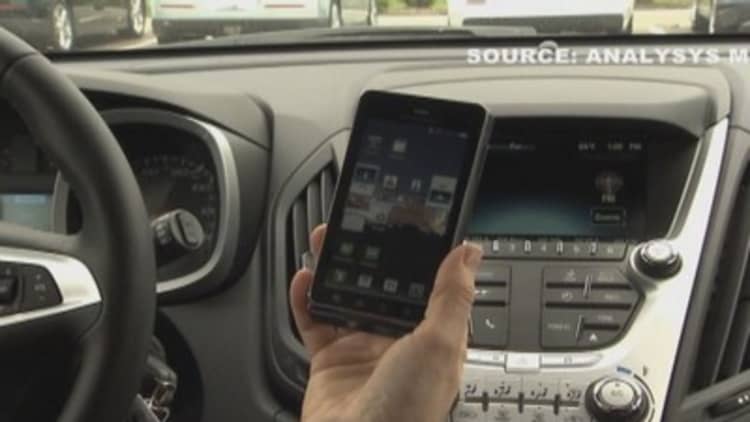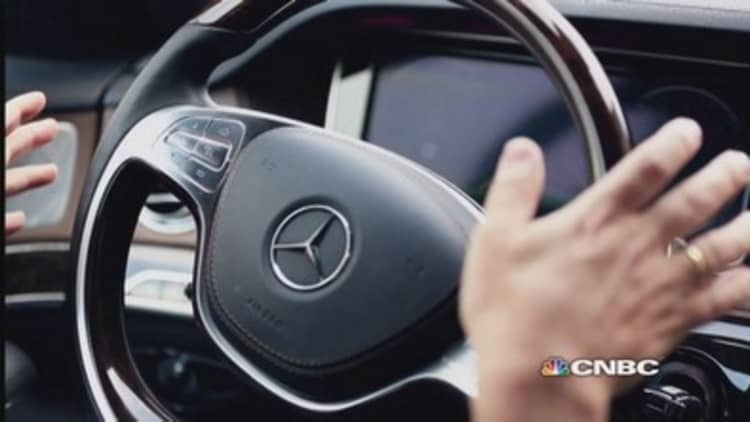
This is for the scores of vehicle owners who are tired of not being able to get their in-car communication systems to work: You are not alone in your frustration.
In fact, a new study found that in-car connectivity and communication systems are twice as likely to break down three years after a driver buys a new car than they are during the first three months they own that vehicle.
"Bluetooth and voice recognition systems not working are the top two problems vehicle owners are reporting after three years of having their cars," said Renee Stephens, vice president of U.S. Automotive for J.D. Power. "They are tired of this technology not working in their cars."
Read MoreBuick—yes Buick!—tops auto rankings
J.D. Power's annual Vehicle Dependability Study, released Wednesday, found that 55 percent of drivers surveyed about their 3-year-old vehicles said the Bluetooth system does not recognize their phone. Separately, 31 percent said their phone does not automatically connect to their car when they get inside. Bluetooth did not respond to a request for comment.
"In many cases, these people have never been able to connect their phones and use these tech features," Stephens said. "It is particularly frustrating since so many states have made it illegal to hold and use a cellphone while driving, but for these owners the hands-free system is not working."
Read MoreSelf-driving cars will kill some legendary auto brands
The study is based on the responses of more than 34,000 people surveyed about their 2012 model year vehicles, after three years of ownership. In 2012, roughly one-third of vehicles sold were equipped with Bluetooth or voice recognition systems.
Opportunity for the tech industry
The lack of reliable technology features in vehicles highlights an opportunity for that industry, which is increasingly focused on in-car connectivity and infotainment systems.
Google's Android Auto and Apple's CarPlay are two systems designed to allow vehicle owners to seamlessly integrate their smartphones into their vehicles. An estimated 650,000 vehicles will incorporate those systems this year, but IHS Automotive forecasts the market for them explode in popularity over the next decade.
2015 Vehicle Dependability Study
| Rank | Brand |
|---|---|
| 1 | Lexus |
| 2 | Buick |
| 3 | Toyota |
| 4 | Cadillac |
| 5 | Honda/Porsche (tie) |
Source: J.D. Power
If CarPlay, Android Auto or another system can show they have better reliability than current in-car communication and infotainment systems, Stephens predicts consumers will want them.
Read MoreWhat Americans want in self-driving cars
"Car buyers want to stay connected when they are driving. They have reliable service and features with their smartphones and they want the same thing from their vehicles," she said.
J.D. Power said it is unclear exactly why vehicle technology breaks down more often as cars approach the three-year mark. The market research firm found the fewest problems with Lexus models, followed by Buick and Toyota. On the flipside, Ford dropped in the latest survey, due in part to problems from the company's launch of a new version of the Focus in 2012.
"Ford remains absolutely committed to delivering the best quality for our customers with every new vehicle," the company told CNBC in a statement. "The 2014 J.D. Power IQS and other third-party results are validating our own internal metrics that show continual improvement in quality across the Ford and Lincoln lineup."

J.D. Power's Stephens said that more auto dealers should start focusing on helping customers with their Bluetooth and in-car connectivity systems. Some are already setting up special classes or sessions where car buyers can better understand how to use the technology, and help them troubleshoot when the systems break down.
This will build good will between dealers and car owners, and encourage them to come back the next time they need to purchase a vehicle.
"This is a real opportunity for dealers," she said.
Questions? Comments? BehindTheWheel@cnbc.com.


